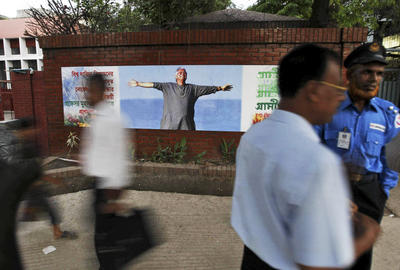For that, credit must go to Yunus and his team.
Besides the Nobel Peace Prize and many other accolades, Yunus has brought pride to his people, known mostly for their poverty and natural calamities.
But on 2 March 2011, the Bangladesh government removed Yunus from the bank, a move he has battled without success all the way to the Supreme Court. The argument by Yunus’ supporters at home and the foreign governments is that this is less of a legal issue, and more a political one; hence it should be resolved politically through a compromise.
Yunus’ removal has attracted international attention. From Nicolas Sarkozy to Hillary Clinton, a host of luminaries have spoken for him. The US has ‘warned’ (the word US official Robert O. Blake used while visiting Dhaka) Prime Minister Sheikh Hasina Wajed that ‘no meaningful discussion’ on bilateral issues could take place until the matter is resolved and a ‘compromise’ reached.
The issue is between the government, which wants to enforce a law requiring banks to retire their CEOs at 60, and Yunus, now 71, who wants to retain control of Grameen, claiming it will collapse without him.
To Yunus’ advantage, the government is heavily dependent on foreign funds for its development programs. It cannot afford to annoy the world’s high and mighty, which are also donors, key trade partners and importers of its manpower. And here Yunus enjoys high credibility with the international community. At home, Yunus is deified as an icon that speaks and works for the poor. The political opposition, much of the intelligentsia, the media and civil society are rooting for him.
So why is the government after Yunus?
To this, there is no clear answer emerging from the raging debate. But Yunus, himself, is not without controversy. A dispute with Norwegian donors amicably settled earlier resurfaced in a documentary last year. Yunus denied any siphoning of funds, and the Norwegians, too, stood by him.
Further, the government retains the power to monitor and regulate the bank. And the negative publicity does little for the government’s legitimacy. Yunus also denies being a political threat to anyone. Soon after he was awarded the Nobel in 2006, there was a suggestion that he head the caretaker government that was meant to last for 90 days, but stayed on for two years. Although not a part of the caretaker government, during its tenure he floated a political party but later dismantled it due to a lack of support.
However, Grameen, a microcredit ‘pioneer,’ also needs a closer look.
Grameen has done well in Bangladesh and several other countries, but has a lesser-known side: it charges interest at rates of between 24 to 36 per cent and levies service charges.
The interest rates in adjoining West Bengal, India, are much lower. Even the traditional Bania moneylenders charge between 24 to 30 per cent. Bangladesh’s state sector banks, whose rural spread is wide but not as deep as Grameen’s, charge just 7 per cent.
In 1974, two years before Grameen, Ela Bhatt, a gutsy Indian woman, launched the Self-Employed Women’s Association (SEWA), a bank developed upon principles advocated by Mahatma Gandhi.
Renowned Indian economist Jagdish Bhagwati pointed out that, unlike Grameen Bank, SEWA had received no foreign money, and it has distributed dividends of 9–12 per cent annually each year since its founding.
Throughout its existence, SEWA has been regulated by the Reserve Bank of India, staying strictly within the law and seeking no special dispensations. Compare this with the various criticisms leveled against the Bangladeshi government over their efforts to monitor Grameen.
In Grameen’s case, Yunus and his family members are in control. The company’s diversification into telecoms — Grameen Phone is Bangladesh’s largest telecommunications company — and other expansion plans are — while undoubtedly beneficial as it results in more jobs — not liked by potential donors who see Yunus as a competitor.
But these issues remain inside the ambit of Bangladesh’s domestic political and economic landscape. And as noted by Bhagwati, by getting the US to side with Yunus against the Bangladeshi government, ‘Hillary seems guilty of arrogantly intervening in the domestic affairs of a friendly, democratic government.’
As international pressures build up amid media hype, and emotions run high, the controversy, unfortunately, has not done anybody good.
Mahendra Ved is a New Delhi-based writer and columnist. An earlier version of this piece, ‘Why Grameen Bank needs a closer look’, was published here in the New Straits Times.

